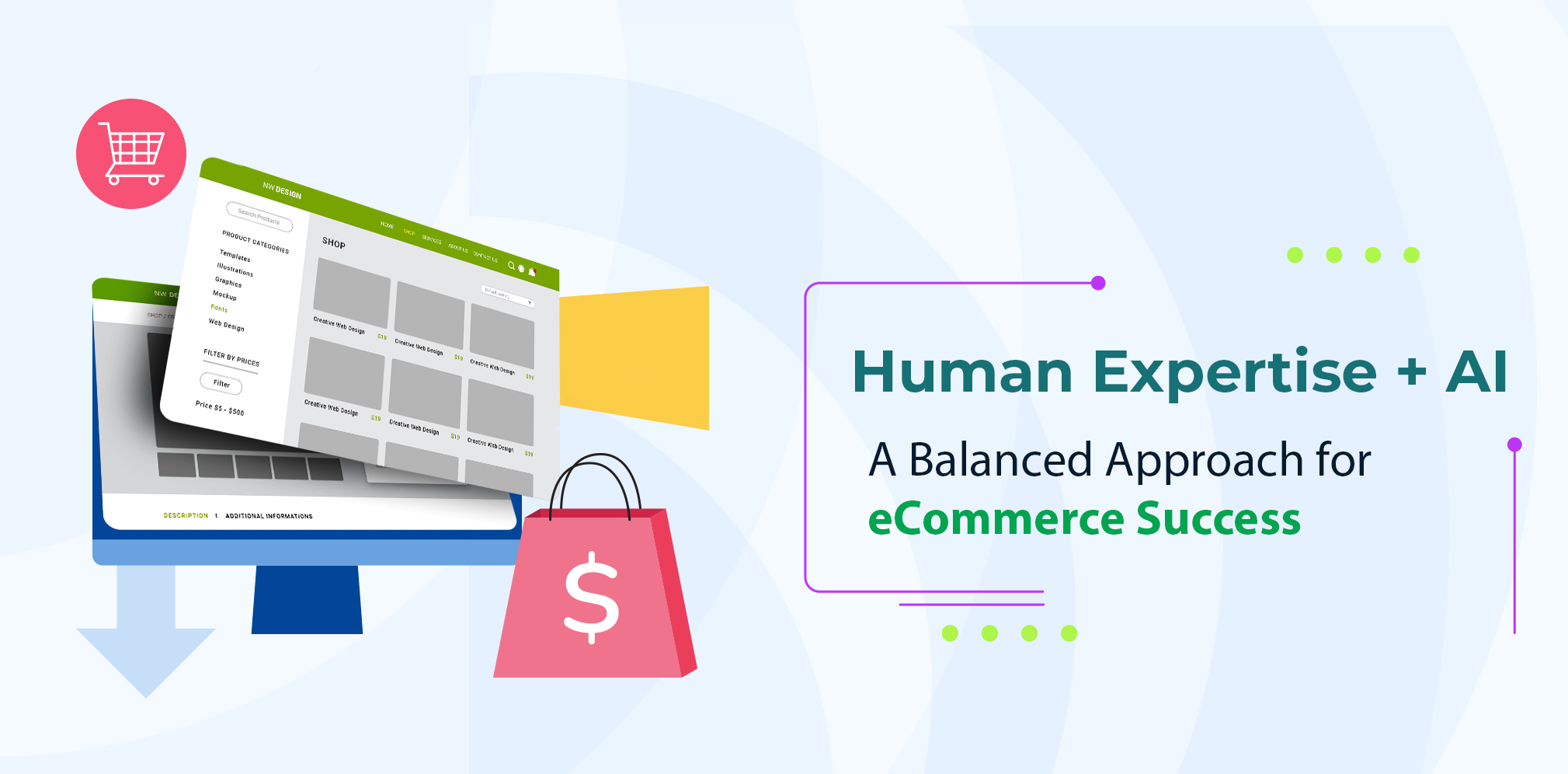According to The State of Personalization Report 2024, published by Twilio Segment, AI-driven personalization is a growing trend in eCommerce. 92% of businesses use Generative AI to drive success. Some common use cases include offering smart product recommendations, quicker product description generation, and improved search using images.
eCommerce businesses, especially those dealing with thousands of SKUs every day, rely significantly on generative AI for their catalog management operations. However, depending solely on AI can often result in data inaccuracies, subpar image quality, and compliance challenges across various platforms.
An alternative to pure AI could be a hybrid approach, where Human-in-the-Loop (HITL) expertise is added to the mix. This method uses AI-enabled processes such as product classification, image tagging, and search relevance optimization, while also employing trained professionals to verify data accuracy, improve categorization, and oversee quality control. This joint effort ensures that product catalogs are well-structured, legally compliant, and is considerate of customer needs.
In this article, we will see how AI and human expertise can do wonders in catalog management, when used in tandem, resulting in improved operational efficiency, higher search accuracy, and better customer engagement.
Why Use Both AI and Human Expertise in Catalog Management?
AI brings speed to any catalog management process. However, to make the process more efficient, it lacks the much-needed contextual understanding that human experts provide. A combined approach ensures catalog integrity and scalability without sacrificing accuracy.
What AI Handles Well:
- Product Categorization: AI uses predefined models and algorithms to classify products into categories based on keywords, descriptions, and past classifications. This speeds up the process for large-scale catalogs and helps organize products effectively.
- Image Processing: AI can automatically detect, crop, and resize images to fit platform requirements. It also improves image clarity and consistency across listings.
- Search Optimization: AI helps with product discoverability by including keyword-rich tags in listings, keeping in mind, popular search trends and probable search terms.
- Competitive Pricing Intelligence: AI can identify price fluctuations, analyze pricing strategies other businesses use, and study product demand patterns. It provides insights into market trends so that businesses can adjust their pricing and stay competitive.
Where Human Expertise is Essential:
- Contextual Refinement: AI may misclassify products with multiple uses or unique attributes. Human teams review and refine classifications, ensuring products are categorized correctly based on industry-specific knowledge.
- Data Verification & Compliance: AI-generated descriptions sometimes pull in outdated or incorrect details. Human reviewers check product descriptions, specifications, and regulatory compliance to ensure accuracy.
- Image Quality Control: AI can process images but might not detect branding inconsistencies, poor lighting, or misleading visuals. Human intervention can help with quality assurance checks to ensure product images are high-quality and meet marketplace guidelines.
- Handling Complex Listings: Some products can have multiple variations, such as size, color, or material differences. Humans ensure these variations are clearly presented and labeled correctly to avoid customer confusion and reduce return rates.
By integrating AI for automation and human expertise for quality assurance, you can ensure your catalog data is accurate, well-structured, and optimized for business goals.
How AI and Human Expertise Work Together in Key Catalog Management Areas
NextWealth is an experienced player in the field of HITL solutions. NextWealth employs a structured approach, using AI to automate workflows while training specialized teams to handle tasks requiring human judgment. Here’s how the two work together across different catalog functions:
1. Product Categorization and Attribute Mapping
Placing products in the correct categories improves search relevance and customer experience. While AI automates categorization, human specialists refine classifications and attribute mapping to prevent errors.
- AI scans product data, identifies keywords, and assigns initial categories based on machine learning models trained on vast product datasets.
- Human teams review AI-generated classifications, checking for accuracy and refining ambiguous assignments that AI might misinterpret, such as fashion accessories that overlap between categories (e.g., handbags classified under both “fashion” and “travel accessories”).
- HITL specialists ensure attribute mapping is correct, verifying that product features such as material, dimensions, or color are consistently applied and formatted according to marketplace requirements.
2. Image Cropping, Formatting, and Quality Control
In eCommerce, high-resolution, well-formatted product images are of utmost importance. While AI makes the process of image recognition quick and hassle-free, human supervision is required to make sure the images follow brand guidelines.
- AI easily detects backgrounds for quick removal and replacement. It can also resize images to standard aspect ratios for popular platforms like Amazon and Shopify.
- A team of human professionals manually checks images to ensure visual consistency across product lines and platforms. They identify and address issues such as incorrect aspect ratios, low resolution, or misplaced branding elements.
- These teams also correct errors in lighting and color accuracy, reducing the chances of product images not being true to life, leading to greater customer satisfaction and lower product return rates.
3. Data Enrichment and Product Description Optimization
AI-generated product descriptions require human refinement to maintain clarity, SEO relevance, and compliance.
- AI extracts attributes from manufacturer data and older listings to create SEO-friendly product descriptions.
- Human editors revisit these descriptions to remove factual errors and to ensure clarity of language and adherence to brand guidelines.
- The human team also monitors appropriate keyword placement, organically incorporating high-performing search terms to improve searchability without resorting to keyword stuffing.
4. Competitive Benchmarking and Pricing Accuracy
AI helps businesses track pricing trends, whereas human analysis ensures the strategic application of insights.
- AI monitors competitor listings and identifies price fluctuations and promotional patterns on a continuous basis, helping businesses understand market trends.
- Human analysts cross-check these pricing recommendations, guaranteeing that discounts, dynamic pricing, and seasonal adjustments are in line with the retailer’s revenue goals and marketing strategy.
- Human supervision ensures that AI-powered pricing models do not lead to lower profit margins or violate platform-specific policies, striking a balance between competitive pricing and business profitability.
5. Compliance with Marketplace Standards
Different eCommerce platforms have unique guidelines. AI can help structure data, but human teams ensure full compliance with regulations.
- AI scans and formats product listings according to platform specifications, ensuring mandatory fields such as weight, dimensions, and legal disclaimers are included.
- HITL teams manually review listings to catch formatting inconsistencies, verify restricted product policies, and ensure descriptions meet marketplace-specific requirements, reducing the likelihood of product delistings or compliance violations.
Catalog management benefits from a balanced approach incorporating the speed and efficiency of AI and the accuracy that comes as a result of human expertise. This is where NextWealth steps in, with a wide array of catalog management services that employ HITL models.
Whether you’re looking for A+ cataloging, taxonomy mapping, duplication checks, or catalog enrichment, NextWealth’s team of trained experts can give you an edge over companies that rely on run-of-the-mill AI processes. Get in touch with us to explore how we can optimize your eCommerce catalog for maximum growth.
Reference Links:
https://www.forbes.com/councils/forbesfinancecouncil/2025/03/14/ais-expanding-role-in-retail-and-e-commerce-balancing-efficiency-with-human-touch/
https://ufleet.io/blog/ai-trends-in-ecommercehttps://www.twilio.com/en-us/press/releases/sopr-2023

